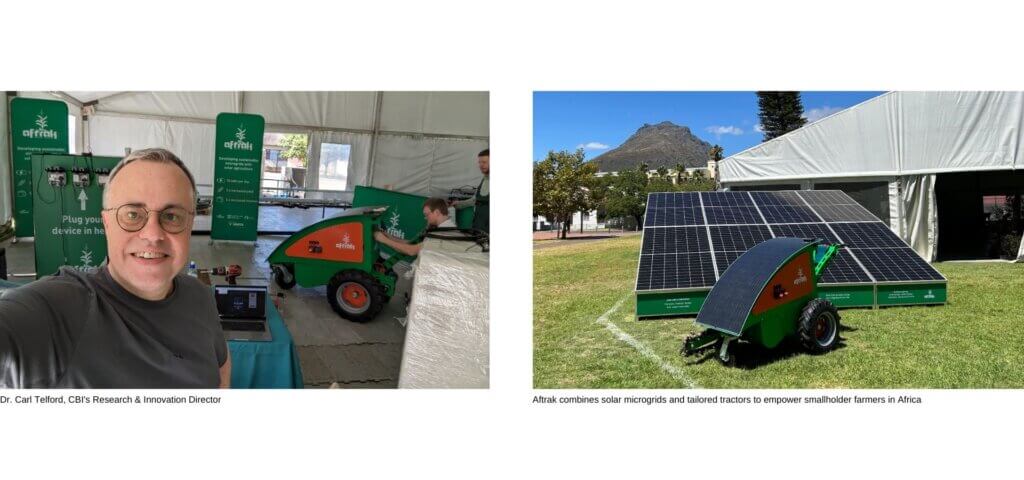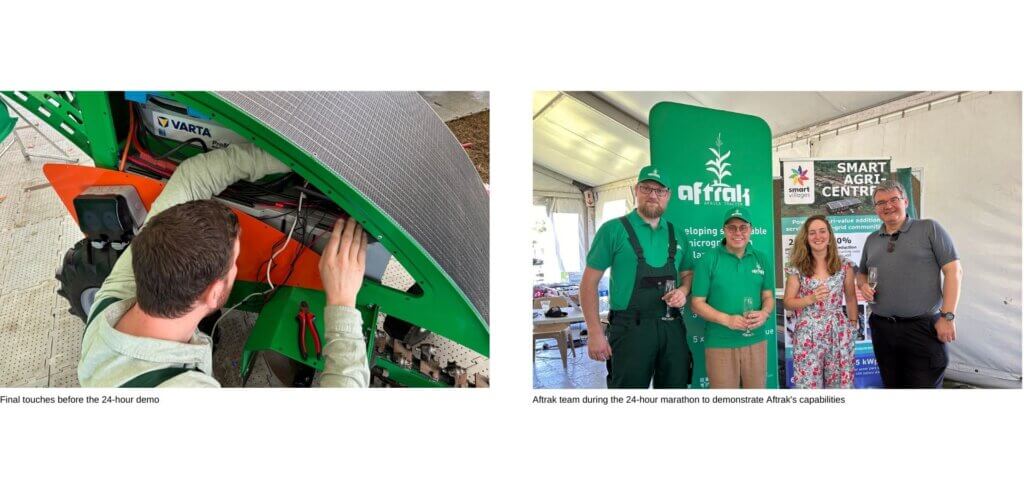
Aftrak is an innovative project combining solar microgrids and tailored tractors to empower smallholder farmers across Africa. In this interview, Dr. Carl Telford, CBI's Research & Innovation Director, talks about his trip to South Africa to demonstrate Aftrak's capabilities and their exciting journey as finalists for the Milken-Motsepe Prize in Green Energy.
Could you start by telling us a bit about Aftrak? What are you aiming to achieve with this initiative?
Aftrak is more than just a tractor. It's a complete ecosystem where agriculture boosts energy provision, and that energy revolutionises how we farm, leading to economic empowerment. It all started with Jonathan Wilson getting the idea for Aftrak in a hotel bar in Malawi during an Innovate UK field trip about 18 months ago.
Since then, we've secured over £300,000 in funding, designed and built two innovative tractors, and created a smart solar array to power them, all using green energy and recyclable materials. These tractors are easy to assemble and self-propelling, making them accessible to just about anyone. Plus, they use standard 12V truck batteries, so they can also power other essential devices like fridges and lights.
Aftrak made it as a finalist for the Milken-Motsepe Prize in Green Energy. How did you feel when you got the news? What could this mean for the project moving forward?
I was absolutely overjoyed but also a bit torn. On one hand, I couldn't believe we'd made it to the finals of such a prestigious competition. On the other hand, given all the innovation and hard work we've put in, I felt it was well-deserved. Being a finalist is a major achievement and opens up opportunities to expand and potentially create a whole new sector if we win!

24 hours of innovation
In February, you went to South Africa to demonstrate Aftrak's capabilities. Before heading to South Africa, what were you hoping to accomplish with the demo?
Our first goal was to have all the systems up and running smoothly. The team from Loughborough did an amazing job in this regard. Just getting the units shipped was hard enough in a short time. It was a real challenge, but seeing it all come together and work was just incredible.
How did people react to Aftrak, and what kind of feedback did you get right off the bat?
The response we received was overwhelmingly positive. People were impressed by our team's professionalism and how well everything was set up. They also seemed curious about the Aftrak unit itself, asking what it was, which led us to hold a few mini-training sessions. The Solar Array, in particular, got a lot of attention, with several attendees asking about purchasing it!
You and the team pulled off a 24-hour demo marathon. How did it go, and what were some standout moments?
The 24-hour demo was all about proving that our system could reliably generate 90kW/h of electricity. We exceeded those expectations, which was fantastic. We also wanted to prove the tractor worked. So we got it to dig in a sand pit and power a chest freezer and a tea urn. One funny moment was during the night when we could monitor energy usage and tell the exact time when the security team was making tea!

Redefining farming strategies
Deep bed farming is central to Aftrak's strategy. Can you tell us about this method and the difference it makes for the farmers and communities?
In some parts of Africa, a hard layer beneath the soil stops water and roots from penetrating, which is terrible for farming. Our partner Tiyeni developed Deep Bed Farming, which is a proven method that breaks up this layer, increasing crop yields, reducing flooding, and providing additional revenue for smallholder farmers. This technique, however, requires a lot of manual labour. Unless you use an Aftrak unit, which can do it for you.
Trips like these always have their surprises. What was something unexpected that happened during your time in South Africa?
One of the most unexpected things was a sudden power outage during our setup, which is a huge issue in South Africa. At one point, the entire demo tent went dark! However, we quickly hooked up our tractor to the power supply, lighting up the tent again and allowing everyone to continue their preparations.
With the announcement just around the corner, how do you feel about Aftrak's chances?
It may sound like a cliche, but making it to the final five is the real achievement. Just getting on the stage at the Milken conference is already a win for me. I believe we have a chance, but I don't have any additional expectations from this point on. I don't think we could have done any more in terms of preparation, and I have confidence in the team going forward, whether we win or not. That's all I have to say!

Aftrak's vision for the future
Looking down the road, what's the big dream for Aftrak? Where do you see it going, and what kind of impact do you hope it'll keep having?
It's very straightforward. We want to provide access to energy, double crop yield, reduce flooding, and enable economic and literal empowerment for millions of people in sub-Saharan Africa. However, to achieve this, we have a lot of work ahead of us.
We need to establish a company or, at least, find some way of building it on a large scale. Additionally, we must ensure the system is affordable for end-users. Despite these major challenges, we have made huge progress in the last 18 months, and I believe these are achievable.
Among all the milestones Aftrak has achieved so far, is there one that stands out as a 'wow' moment for you? What made it so memorable?
There are two. The first was when I saw the Aftrak unit in person at Loughborough University, all set to ship out to South Africa. It made all of it seem real. The second moment was when I arrived at the demo site in Stellenbosch. There, I saw all the equipment being set up, and I also met the team from Malawi for the first time in person.
At that point, I remembered Jonathan's initial idea that we had discussed in the hotel bar. A lead-battery tractor? At that time, I told him he was crazy. But the more we explored the idea, the more it made sense. In Stellenbosch, after seeing the people and the technology, my belief in what we were doing took off like a rocket.